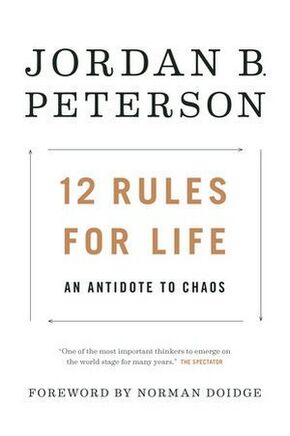12 Rules for Life: Difference between revisions
Appearance
m Admin moved page 12 Rules for Life: An Antidote to Chaos to 12 Rules for Life: Misspelled title |
No edit summary |
||
| (One intermediate revision by the same user not shown) | |||
| Line 1: | Line 1: | ||
{{Book | {{Book | ||
|Image=12_Rules_For_Life.jpg | |Image=12_Rules_For_Life.jpg | ||
|Subtitle=An Antidote to Chaos | |||
|Author=Jordan B. Peterson | |Author=Jordan B. Peterson | ||
|Topic Tags= | |Topic Tags=Life Philosophy, Meaning & Purpose | ||
|Description= | |Description=This book offers a practical guide for living a more meaningful and responsible life through a set of twelve challenging principles. | ||
| | |Is Featured=Yes | ||
}} | |Status=Published|Display Title=12 Rules for Life|Main Categories=Master Yourself|Overview=12 Rules for Life is a collection of essays where Jordan Peterson lays out, well, 12 rules for navigating the chaos of existence. Each rule is explored through a mix of psychology, philosophy, ancient myths, religious texts, and his own clinical experience. It's not a self-help book in the typical sense; it's more about embracing personal responsibility, confronting suffering, and striving for competence and truth in a world that can feel overwhelming. He pushes readers to tidy their own lives before trying to fix the world, starting with simple things like standing up straight.|Why We Recommend It=This book gets recommended a lot because it offers a really strong, almost uncomfortably direct, framework for personal growth. Instead of telling you everything will be easy, Peterson emphasizes facing life's difficulties head-on and finding meaning in that struggle. It's not about quick fixes, but about building resilience, character, and finding your own path in a complex world. It challenges you to think deeply about your actions and their consequences.|Who It's For=If you're someone who feels a bit lost, overwhelmed by modern life, or are looking for a more robust philosophy to guide your actions, this book could be for you. It appeals to people interested in psychology, philosophy, and those who are willing to grapple with challenging ideas about truth, morality, and individual agency. If you're looking for profound insights into human nature and a call to take more responsibility, give it a read.|Good to Know=Peterson's writing style can be pretty dense and academic at times, so it's not a light, casual read. You'll probably find yourself pausing to think a lot. It also touches on controversial topics and has sparked a lot of debate, so be prepared to engage with ideas that might challenge your existing viewpoints. It's definitely a book that encourages deep reflection rather than just passive consumption.}} | ||
Latest revision as of 20:56, 1 August 2025
12 Rules for Life is a collection of essays where Jordan Peterson lays out, well, 12 rules for navigating the chaos of existence. Each rule is explored through a mix of psychology, philosophy, ancient myths, religious texts, and his own clinical experience. It's not a self-help book in the typical sense; it's more about embracing personal responsibility, confronting suffering, and striving for competence and truth in a world that can feel overwhelming. He pushes readers to tidy their own lives before trying to fix the world, starting with simple things like standing up straight.
This book gets recommended a lot because it offers a really strong, almost uncomfortably direct, framework for personal growth. Instead of telling you everything will be easy, Peterson emphasizes facing life's difficulties head-on and finding meaning in that struggle. It's not about quick fixes, but about building resilience, character, and finding your own path in a complex world. It challenges you to think deeply about your actions and their consequences.
If you're someone who feels a bit lost, overwhelmed by modern life, or are looking for a more robust philosophy to guide your actions, this book could be for you. It appeals to people interested in psychology, philosophy, and those who are willing to grapple with challenging ideas about truth, morality, and individual agency. If you're looking for profound insights into human nature and a call to take more responsibility, give it a read.
Peterson's writing style can be pretty dense and academic at times, so it's not a light, casual read. You'll probably find yourself pausing to think a lot. It also touches on controversial topics and has sparked a lot of debate, so be prepared to engage with ideas that might challenge your existing viewpoints. It's definitely a book that encourages deep reflection rather than just passive consumption.
